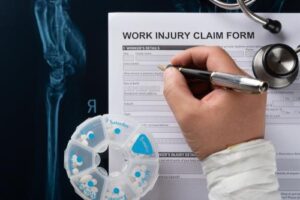
You likely qualify for workers’ compensation in Georgia if you suffer from tennis elbow due to work-related activities. As long as the condition was a result of your job, Georgia workers’ comp will cover repetitive motion injuries like tennis elbow.
However, to receive full compensation benefits, you must establish that your job directly caused the condition. If you’re facing challenges with your work injury claim for tennis elbow, an experienced Atlanta workers’ compensation lawyer can be invaluable.
An attorney can help you gather the necessary evidence and file your paperwork correctly so you can receive the compensation you deserve for your work-related injury.
What Is Tennis Elbow?
Tennis elbow, also known as lateral epicondylitis, is a painful condition affecting certain tendons in the elbow. The tendons that connect the forearm muscles to the bone on the outside of the elbow are frequently strained as a result of repetitive arm, wrist, and hand motions.
Tennis elbow gets its name because it is commonly seen in tennis players, although any activity involving repetitive gripping and wrist motions can cause it. The technical term lateral epicondylitis refers to inflammation of the tendons that attach to the lateral epicondyle, the bony part on the outer side of the elbow joint.
The main symptoms of tennis elbow include:
- Pain in on the outer elbow that radiates into the forearm
- Stiffness and weakness in the elbow
- Difficulty gripping objects
- Tenderness and soreness on or near the bony bump on the outside of the elbow
- Discomfort that is aggravated by lifting, twisting, and shaking arm motions
While called “tennis elbow,” this condition occurs most frequently in non-athletes who do repetitive arm and wrist motions in their jobs. Treatment for mild cases involves rest, icing the elbow, braces, physical therapy, medication, and modifying activities to avoid those that cause the condition.
Get the strong arm
What Activities Can Cause Repetitive Stress Injuries at Work?
Repetitive motions and excessive use of the arm, wrist, and hand muscles while performing job duties can result in tennis elbow and other repetitive stress injuries.
Common examples of work activities that can bring on symptoms of tennis elbow over time include:
- Gripping tools like hammers, screwdrivers, and pliers that require firm grasping and wrist-twisting motions
- Operating vibrating power tools like jackhammers or chainsaws
- Making the same arm and wrist motions over and over, such as typing on a keyboard, working an assembly line, or scanning items as a cashier
- Performing a task that requires holding the arm up for prolonged periods, like painting walls or working on an assembly line
- Moving the wrist forcefully, such as brushing or scrubbing vigorously
- Lifting heavy objects with the palms facing down or supinated
These are just a few examples. Any activity that involves repeated arm, wrist, and hand movements can lead to repetitive stress injuries like tennis elbow or carpal tunnel syndrome.
What Evidence Do I Need to Prove My Tennis Elbow is Work-Related?
To receive workers’ compensation benefits for tennis elbow in Georgia, you must provide compelling evidence that your elbow condition is directly related to your employment and job duties.
Examples of evidence our work injury lawyers might use include the following:
- Medical records: These should show when elbow pain and issues began, ideally after you started a new job with repetitive motions. Records should document worsening symptoms over time.
- A statement from your doctor: This statement should link the condition specifically to your occupational duties and the repetitive arm, wrist, and hand motions involved. This “medical causation” is crucial.
- Details about your exact work tasks: These details should include descriptions of any repetitive gripping, torquing, lifting, typing, or other actions you do on the job that strain your arm or elbow.
- Witness statements: These may be from coworkers who have observed you doing repetitive tasks and can attest to the nature of your work activities.
- Lack of elbow injuries and conditions outside of your job: Your lawyer will look for evidence showing your tennis elbow developed solely from work activities and not other hobbies or sports.
- Photos or videos: If the insurance company tries to claim your injury didn’t happen at work, your workers’ compensation lawyer could present photos or videos of you performing repetitive motions at work that apply force to the elbow.
Working with one of our attorneys can help ensure you gather the right evidence to prove your tennis elbow arose out of your employment.
Free Consultation Regarding Your Work Injury
If you’ve suffered a work-related injury, contact John Foy & Associates to schedule a free consultation. Our experienced attorneys will evaluate your situation and your options for pursuing compensation. We fight for maximum the maximum compensation available in workers’ comp cases and handle disputes with insurance carriers.
With over 20 years of assisting injured workers across Georgia, we have the knowledge and resources to protect your rights. Your initial consultation is free, and you pay nothing unless we win your case. Call or contact us online to get started.
404-400-4000 or complete a Free Case Evaluation form





